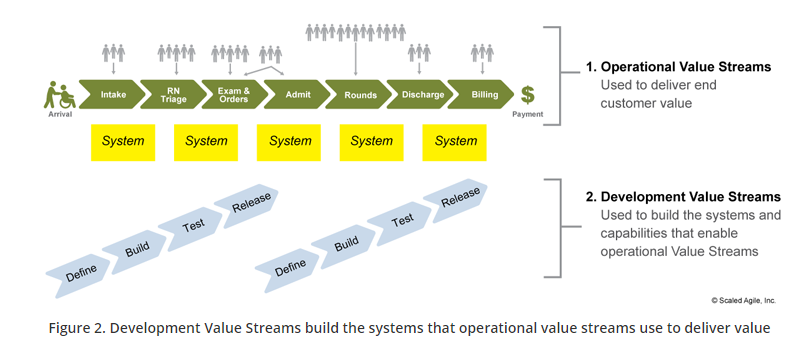It may not be obvious, by the concept of a value stream is one of the most important concepts in a digital transformation. Why? Because once you understand a value stream, you start to truly understand your business and you’re on a clear path to improving customer experience. Exceptional customer experience is your key business differentiator in the world of digital disruption and needs to be the core focus of any digital transformation.
Let’s define a value stream. I’ll use what I consider, to be the best sources of knowledge reference.
First from Scaled Agile.
If you click on the image it will take you to the Leading SAFe 2 Day course I run at ALC Training.
Second from the TOGAF certification, written by the Open Group:
- Value Stream Mapping: the breakdown of activities that an organization performs to create the value being exchanged with stakeholders. It illustrates how an organization delivers value and are in the context of a specific set of stakeholders, and leverage business capabilities in order to create stakeholder value and align to other aspects of the Target Business Architecture.
And here is a picture of a sample value stream map for an online purchase:

And here is another, outlining an emergency hospital admission:

As you can see it’s a simple overview, usually shown in 5-9 stages, of how a product or service starts life and is delivered to the consumer.
As you can see, the business processes beneath can vary in complexity. With an online purchase, the process is relatively simple. With say intensive care, the process can be extremely complex and there are probably 1000’s or paths, depending on the type of care required.
It can also be known as:
- Value Chain Diagram
- Functional Reference Model
Clearly, there are many values streams and they are quite different between industries.
Once we understand our value stream, we can then consider decomposing each component into systems and people. An example of this is from Scaled Agile, where they define two types of value streams:

You’ll notice that the operational value stream is the one that is focused on the customer. Whereas the development value stream is aligned to delivering systems in an agile manner. In fact, these are development value streams are also known as a CI/CD pipeline:
- CI = Continuous Integration – committing code at least once a day.
- CD = Continuous Delivery – making sure code is always in a releasable state.
So what we’ve now done, is to understand our business in the context of delivering value through software. We cover this in our DevOps Foundation course:
Any questions on Scaled Agile or DevOps concepts, as always please reach out via twitter – @MusicComposer1 or find me on LinkedIn:





